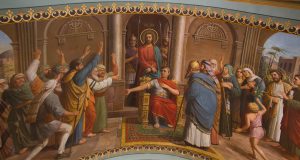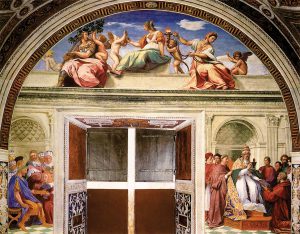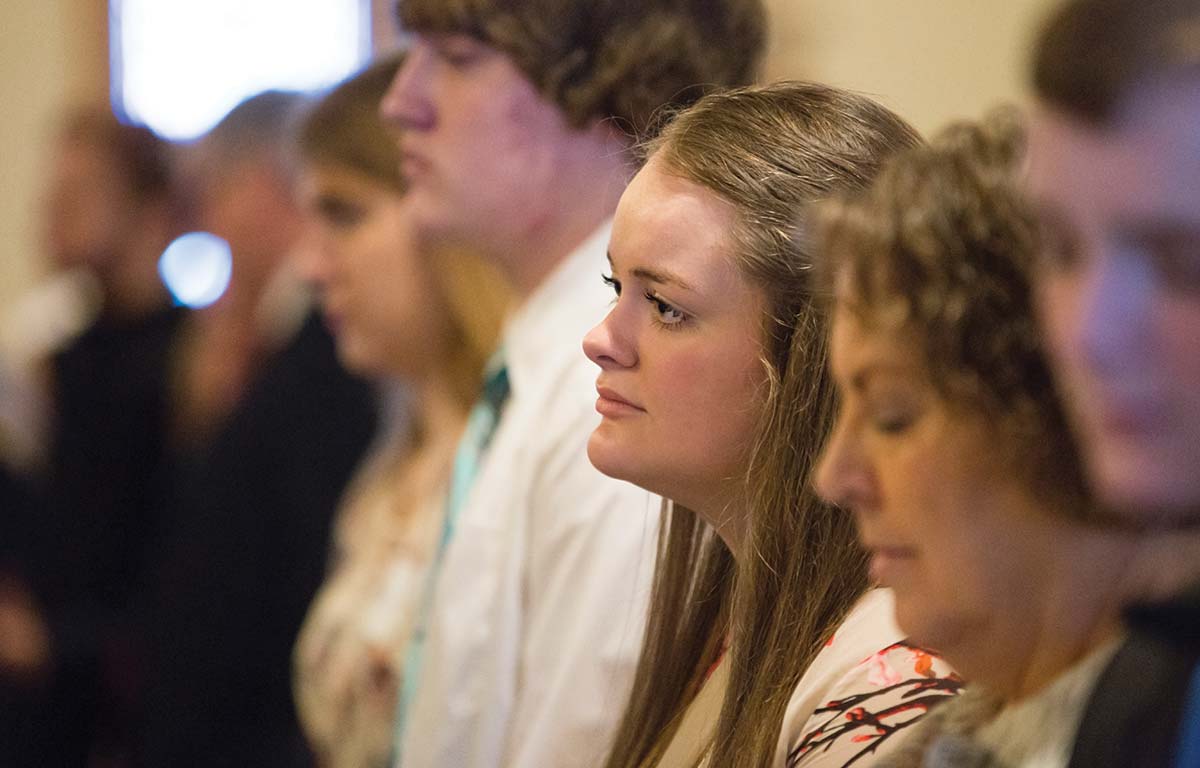
Story written by Maricarrol Kueter for The Bishop’s Bulletin
Baylee Beaner found her Confirmation inspiration in the pious example of St. Therese of Lisieux, the 19th century French girl who became a nun at the age of 15.
The Garretson teen-ager took the saint’s name, embracing St. Therese’s acceptance of God’s will in her life.
Bishop Paul Swain described a similar feeling of peaceful acceptance he experienced as a young adult, sitting by his grandmother’s hospital bedside. Fear and despair gradually evaporated through prayer, he told Baylee and her 32 classmates from St. Joseph, Huntimer and St. Rose of Lima, Garretson at their Confirmation Mass at the Huntimer church last month.
When God challenges us, he also strengthens us, the bishop said.
That strength is courtesy of the Holy Spirit, whose presence is amplified in our spiritual lives through the sacrament of Confirmation.
Swift or gradual, peaceful or igniting, the Holy Spirit moves through our lives, providing a consistent, powerful, faith-filled boost.
It may manifest itself as a sudden burst of courage to tackle a difficult task looming in your life. It might be a long-awaited inspiration for a project you’ve labored over or possibly the determination to proceed with a potentially painful conversation.
“By the sacrament of Confirmation, (the baptized) are more perfectly bound to the Church and are enriched with a special strength of the Holy Spirit,” according to the Catechism of the Catholic Church. “Hence they are, as true witnesses of Christ, more strictly obliged to spread and defend the faith by word and deed.”
The sacred roots of this sacrament, traceable to the introduction of the Holy Spirit to the Apostles on Pentecost, are reinforced each year in the lives of hundreds of teen-agers across the Sioux Falls diocese.
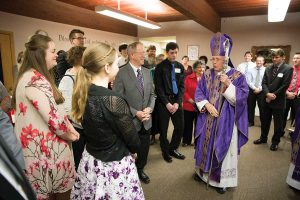
“I’ve seen real change (in young people) over time,” said Bishop Swain, who administers the sacrament of Confirmation. “They talk about it honestly.”
The church teaches that Confirmation is one of three sacraments of Christian initiation. “Baptism, Confirmation and the Eucharist lay the foundation of every Christian life.”
“The reception of the sacrament of Confirmation is necessary for the completion of baptismal grace.”
Father Michael Wensing, pastor of Holy Name Church in Watertown, uses an example to describe the sacrament’s role in a Catholic’s life:
“My brother once explained to a couple preparing for baptism that faith is like a gift, given all wrapped and beautiful. But the child and parents together must at some point open the gift and unpack the contents. Confirmation preparation is about opening and unpacking the great gift of faith already given,” Father Wensing said.
In the Sioux Falls diocese, the sacrament of Confirmation is usually conferred on teen-agers, though traditions elsewhere vary. Many adults also receive the sacrament each year as they join the Church through the Rite of Christian Initiation of Adults. (RCIA)
Young people undergo months of preparation leading up to their Confirmation. The process usually begins with a conversation on the sacrament’s importance and the determination of a student’s readiness to be confirmed.
Diocesan guidelines set expectations for Confirmation preparation, but each parish can add additional requirements. Nearly all ask students to complete some type of community service.
Bishop Swain said the sacrament confers on students a deeper tie to the Church. “It also missions them to be public witnesses of Christ to the world,” he said.
In the course of preparation, Father Anthony Urban, pastor of St. Rose of Lima, Garretson, and St. Joseph the Workman, Huntimer, said he meets with each student to ask questions and offer his input to help with their studies.
“The key teachings that I hope to hand on to the students are the gifts of the Holy Spirit, the fruits of the Holy Spirit, and what it looks like to live a life in the church,” he said.
Father Wensing said he begins Confirmation preparation by talking with parents and any known sponsors a year before the sacrament is to be administered.
“This meeting does not involve the youth candidates themselves, but establishes how important the whole family is in formation and preparation of the candidate,” he said.
Lessons cover church teachings on the sacraments, Mary and the beatitudes, Father Wensing said, and focus on “building the kingdom of God and remaining active, committed Catholics.”
Gaye Lynn Beaner, Garretson, mother of twins Baylee and Brayden, who were confirmed recently, said she tried to help her children in preparation by setting an example and encouraging prayer.
“We pray with them at home and encourage them to serve,” she said.
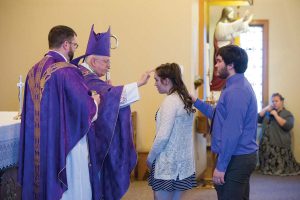
Many pastors also require students to write a letter to the bishop, asking to be confirmed. Bishop Swain said he reads every letter.
“Some are very beautiful. Some very honest,” he said. “We want to make sure the student wants to be confirmed. They will be asked to stand up and profess the faith and we want to be sure they want to make a knowing commitment.”
Father Wensing said that commitment isn’t automatic with high school students. He said teenagers often debate with parents the question of why they should receive Confirmation.
“I don’t know if I want to do that. I haven’t made up my mind if I want to be Catholic,” are common assertions, he said.
Wensing said he advises parents not to get discouraged by the questioning.
“They must still consent to the sacrament for it to be valid, but to put it in perspective, tell the young adult that the gift of Catholic faith has already been given to them in baptism. They already have been touched by the finger of God,” Father Wensing said.
He also recommends the parents relate the discussion to the reception of Holy Communion, noting how every time they go to Communion they have to give the same answer in faith as for confirmation, “Amen.”
“So they have already many times assented to being the Catholic they became in baptism. Confirmation just furthers the grace they have been participating in already,” he said.
Preparation discussions with students offer an opportunity to discuss topics prevalent in young people’s lives and to try to offer guidance, according to Father Urban.
“One of the important things is to answer questions that students have and also address topics that are difficult to discuss such as same-sex marriage, the pro-life message and others,” he said.
Students select community service projects ranging from assisting at church events to volunteering for community charitable activities.
Baylee Beaner volunteered to play the piano at her church and at a local nursing home. She also volunteered to serve at The Banquet, a food ministry in Sioux Falls. Brayden Beaner assisted with snow removal and lawn work at the church.
The volunteer activities were humbling, according to Baylee Beaner. “It taught me a lot about what we are called to do,” she said.
Bishop Swain said community service helps the students progress toward a deeper relationship with God and “develop a desire to help others.
“You’re the hands of Christ in many ways,” the bishop said.
Confirmation students also choose a saint’s name and select a sponsor.
Students are asked to research the lives of saints and select someone that they can relate to, said Bishop Swain.
Brayden Beaner chose St. Gregory, whose emphasis on mission work greatly expanded the church.
Selections range from well-known saints such as Peter and Joseph to lesser-known saints such as Pier Giorgio, who fought for social reforms in Italy in the early 1900s or Maximilian Kolbe, a Polish priest who was martyred at Auschwitz during World War II.
“Relating to a communion of saints is something we are all a part of,” the bishop said.
The students also select an adult sponsor to publicly support them as they are confirmed. The sponsor must be a Catholic and cannot be a parent. Most choose another family member, or an adult friend or mentor.
“A sponsor should be a person who can be a true witness, who lives out their faith and has completed the Sacraments of Initiation,” Father Urban said.
“A sponsor should be a credible witness to the faith that we express in the promises of our Baptism,” he said.
Baylee and Brayden Beaner asked their grandparents, Rita and Michael Beaner of Miller, to serve as their sponsors.
Michael Beaner said the experience of being sponsors allowed them to re-live their own Confirmation experiences. He said he could relate to his grandson the real-life importance of the sacrament.
“The Holy Spirit is alive in your life,” he said, “ I know from my own experience.”
Bishop Swain said the sponsor’s role is to encourage the student and to continue with them after Confirmation day.
“We all have our ups and downs in our journey of faith,” he said. ”This is someone to walk with you.”
As a sacrament experienced by most relatively early in life, confirmation and its meaning for us can slip away over time.
“Almost always I invite those who are at a confirmation to recall the date that they were confirmed,” Bishop Swain said. “That’s one way to remind ourselves on that anniversary that we received the gift of the Holy Spirit and the gifts of the Spirit in that special way.”
Calling on the Holy Spirit and saying particular prayers to the Holy Spirit “also can help us recall our confirmations and be refreshed as to the importance of it and the gift God offers to us through the sacrament of confirmation,” he said.
Rich symbolism and tradition are displayed in the administering of Confirmation. In addition to praying over the candidates with outstretched arms, the Bishop anoints each student’s forehead with Holy Chrism, and shakes his or her hand in a sign of peace.
Bishop Swain said one of the beauties of the Catholic Church is its use of all of the senses in the liturgies. In Confirmation, he said, you have the odor of the holy oil, made from olive oil and balsam, the sense of touch and the spoken words of prayer, “sealing the gift of the Holy Spirit” in the person’s life.
“I appreciate that we use all the senses to invite the transcendent in,” the bishop said.
Confirmation is one of only two sacraments administered by the bishop, although permission may be delegated to a priest by the bishop when pastoral need suggests. The other is Holy Orders.
“In the Acts of the Apostles, some of the original Apostles were sent to Samaria to pray over and lay hands on the newly baptized to receive the Spirit. Thus Bishops, as successors to the Apostles, are sent to the parishes to pray over, lay hands upon and anoint the candidates,” Father Mike Wensing said.
“The laying on of hands is done as an ancient rich sign of imparting the grace and power and Spirit of God.”
Bishop Swan said administering the sacrament “is a great privilege.”
“They (the Confirmation students) come in as a group, but the imposition of oil is one by one. It’s very personal. … It’s a sign of God’s love for them individually,” he said.
Officiating at 40-60 Confirmation Masses each year requires a sizable amount of travel and coordination. Bishop Swain said he tries to individualize each Confirmation homily, at times referring to the Scripture readings of the day or tying in a lesson from the parish he’s visiting.
In his homily at St. Joseph the Workman Church on March 5, Bishop Swain told the Confirmation students the sacrament would give them the “tools of how we may live out discipleship.”
He encouraged them, acknowledging that their preparations likely had been challenging, even tedious at times.
“Spiritual journeys are like that,” he said “Today is a day of fulfillment in your spiritual journey, hopefully, also one of opportunity.”
“You are called to live the gospel of love and mercy – not because you have to; because you want to.”
One of the key teachings in Confirmation preparation is that the sacrament bestows and enriches the “gifts of the Holy Spirit” in those who receive it.
Bishop Swain asked the students to rely on those seven gifts – wisdom, understanding, counsel, fortitude, knowledge, piety and fear of the Lord – in meeting the challenges they will face.
The sacrament gives them the tools to live as disciples, but he warned them it “will not be easy.”
He asked them to hold on to fortitude and courage and “look to the saints for guidance.”
“It’s a huge step in the growth of your Catholic faith,” said Brayden Beaner, after the Mass.
Bishop Swain had reminded the students of the importance of the “great gift of this sacrament to them.”
In this ‘once-in-a-lifetime moment,” Bishop Swain said. “It is God coming to dwell more deeply in their lives.”

